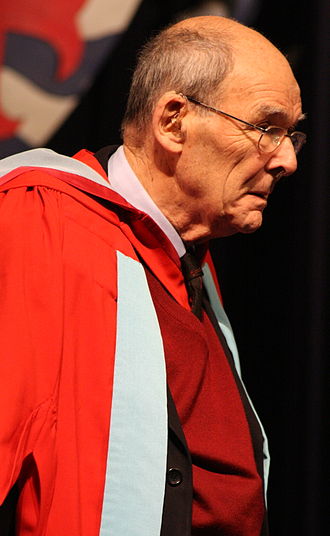David Malet Armstrong
David Malet Armstrong (8 July 1926 – 13 May 2014), often referred to as D. M. Armstrong, was an influential Australian philosopher. He is best known for his work in metaphysics and the philosophy of mind. Armstrong's contributions to philosophy have had a significant impact on contemporary metaphysical debates, particularly concerning the nature of universals, states of affairs, and the mind-body problem.
Early Life and Education
David Malet Armstrong was born in Melbourne, Australia. He attended the University of Sydney, where he studied under the prominent philosopher John Anderson. Armstrong later pursued further studies at the University of Oxford, where he was influenced by the analytic philosophy tradition.
Academic Career
Armstrong held academic positions at several institutions, including the University of Melbourne, the University of Sydney, and the Australian National University. His work is characterized by a commitment to a realist ontology and a naturalistic approach to philosophical problems.
Philosophical Contributions
Metaphysics
Armstrong is perhaps best known for his defense of universals and his theory of states of affairs. He argued for a realist interpretation of universals, positing that they exist independently of the mind and are instantiated in particular objects. His work on states of affairs further developed this view, suggesting that the world is composed of particular objects and the properties and relations they instantiate.
Philosophy of Mind
In the philosophy of mind, Armstrong was a prominent advocate of materialism. He argued that mental states are identical to physical states of the brain, a view known as the identity theory of mind. This position was influential in the development of contemporary discussions on the mind-body problem and the nature of consciousness.
Laws of Nature
Armstrong also made significant contributions to the philosophy of science, particularly concerning the nature of laws of nature. He proposed a theory of laws as relations between universals, which contrasts with the regularity theory of laws.
Major Works
Some of Armstrong's most notable works include:
- Universals and Scientific Realism (1978)
- A Theory of Universals (1978)
- What is a Law of Nature? (1983)
- A Combinatorial Theory of Possibility (1989)
- Universals: An Opinionated Introduction (1989)
- A World of States of Affairs (1997)
Legacy
David Malet Armstrong's work continues to be a central point of reference in contemporary metaphysical debates. His rigorous approach to philosophical problems and his commitment to a realist ontology have left a lasting impact on the field.
Related Pages
- Metaphysics
- Philosophy of mind
- Universals
- Identity theory of mind
- Laws of nature
- John Anderson (philosopher)
- University of Sydney
- Australian National University
Categories
Transform your life with W8MD's budget GLP-1 injections from $125.
W8MD offers a medical weight loss program to lose weight in Philadelphia. Our physician-supervised medical weight loss provides:
- Most insurances accepted or discounted self-pay rates. We will obtain insurance prior authorizations if needed.
- Generic GLP1 weight loss injections from $125 for the starting dose.
- Also offer prescription weight loss medications including Phentermine, Qsymia, Diethylpropion, Contrave etc.
NYC weight loss doctor appointments
Start your NYC weight loss journey today at our NYC medical weight loss and Philadelphia medical weight loss clinics.
- Call 718-946-5500 to lose weight in NYC or for medical weight loss in Philadelphia 215-676-2334.
- Tags:NYC medical weight loss, Philadelphia lose weight Zepbound NYC, Budget GLP1 weight loss injections, Wegovy Philadelphia, Wegovy NYC, Philadelphia medical weight loss, Brookly weight loss and Wegovy NYC
|
WikiMD's Wellness Encyclopedia |
| Let Food Be Thy Medicine Medicine Thy Food - Hippocrates |
Medical Disclaimer: WikiMD is not a substitute for professional medical advice. The information on WikiMD is provided as an information resource only, may be incorrect, outdated or misleading, and is not to be used or relied on for any diagnostic or treatment purposes. Please consult your health care provider before making any healthcare decisions or for guidance about a specific medical condition. WikiMD expressly disclaims responsibility, and shall have no liability, for any damages, loss, injury, or liability whatsoever suffered as a result of your reliance on the information contained in this site. By visiting this site you agree to the foregoing terms and conditions, which may from time to time be changed or supplemented by WikiMD. If you do not agree to the foregoing terms and conditions, you should not enter or use this site. See full disclaimer.
Credits:Most images are courtesy of Wikimedia commons, and templates, categories Wikipedia, licensed under CC BY SA or similar.
Contributors: Prab R. Tumpati, MD

